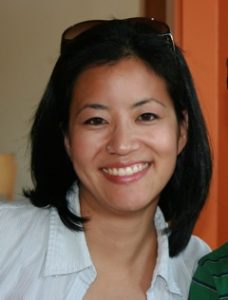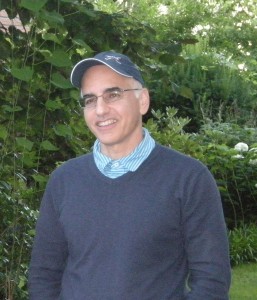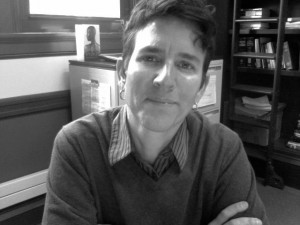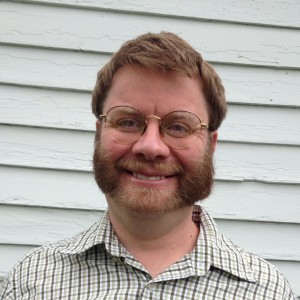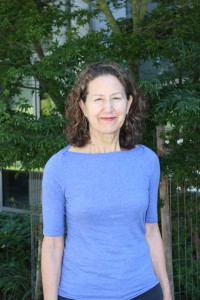
Karen Bassi is Professor of Literature and Classics at the University of California, Santa Cruz.
I am directing a UCHRI Research Residency in fall 2015 on the topic of The History Mortality: Interdisciplinary Approaches. The call for applications for the Residency — with a description — can be found at http://uchri.org/cfps/residential-research-group-fellowship-f2015/. The deadline for applying is February 11, 2015.
As a lead up to the Residency, I will also be directing a workshop on this topic to be held at the UCHRI in January 2015.
I am teaching a senior seminar this term (fall 2014) on the topic of “Ghosts in Pre- and Early-Modern Literature.” This course deals with the ways in which ghosts function as heuristic devices in literature, not only as characters in a variety of genres but also as figures for the effects of aesthetic experience. The course stems directly from discussions that took place during the Institute this summer and incorporates a number of readings and artifacts studied during the Institute.
Together with two other colleagues from the Institute, Deborah Lyons and Renee Calkins, I have submitted a successful panel proposal to the annual meeting of the Classical Association of Great Britain; the meeting will take place April 10-13, 2015 at the University of Bristol. The name of our panel is The Mortal Body and its Afterlives.
I’ve been invited to give a paper at a conference at Wellesley College in May 2015. The conference is on the topic of “House and Home.” My paper, titled “Domesticating Death: “The House of Hades,” will explore a variety of Greek texts and artifacts in which the houses of the dead and the houses of the living suggest a compensatory homology between these two separate realms. The paper is directly related to the work we did during the summer Institute.
I am also in the very early planning stages with NEH participant Gretchen Henderson for an NEH Institute in Washington DC on the role of museums in humanistic research and teaching. More on this as the planning progresses!
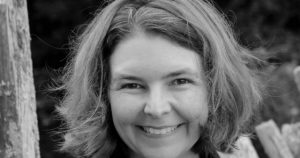
Gretchen E. Henderson is a writer who works at the intersection of literature, creative writing, book history, art history, museum studies, disability studies, and music. She is an Affiliated Scholar at Kenyon College.
• Preparation for the opera performance at MIT of my libretto, Cassandra in the Temples, composed by the Guggenheim-winning composer Elena Ruehr for the Grammy-winning vocal ensemble, Roomful of Teeth. I will be sharing my experience from the institute with classes through my Visiting Artist residency. The Institute and immersion in Greece also provided ideas for future staging.
• The experience helped to shape a commissioned exhibition essay on the artwork of Sanda Iliescu (Associate Professor of Architecture & Art at the University of Virginia), also forthcoming as a chapbook from Gallery Molly Krom in New York City. Additionally, Sanda and I are undertaking a larger writing and art collaboration called “Correspondences.”
• Although the Institute didn’t change my draft of Ugliness: A Cultural History for Reaktion Books, the experience certainly animated the material and issues!
• The Institute’s immersion in museums will be useful to share for my spring course at Georgetown University on “Writing and the Museum.”
Yurie Hong
I am currently working on a book about childbirth in archaic and classical Greek literature. Given that maternal and infant mortality rates in antiquity were very high and inevitably shaped the way that ancient Greeks thought about and represented birth, the topic of this seminar could not have been more fitting. Participation in this institute has enabled me to think broadly about the entire book project and has also contributed significantly to the chapter on childbirth and funerary commemoration.
I am also in the process of designing a January term course on ancient and modern responses to death, grief, and commemoration. I will be able to use my firsthand experience of site visits in Greece as comparanda for students’ consideration of the St. Peter cemetery, the columbarium on campus, and Reconciliation Park in Mankato commemorating the execution site of 38 Native Americans following the 1862 Sioux Uprising, still the largest mass execution on US soil. Such cross-cultural comparisons and direct encounters with monuments and commemorative space will provide students with opportunities to reflect on the ways that death impacts personal experience and communal identity across an array of times, places, and cultures.
Robert Pirro
Darby and I have been emailing back and forth about a collaborative project on the topic of hero cult in Plato. This project takes as its starting points a preliminary cut at the subject that I presented as a political science conference paper back in 2006, Darby’s prior research on lamentation, Darby’s NEH presentation on katabasis in Plato, and my NEH presentation contrasting immortality and eternity as responses to the challenges of political life. We hope to reconsider conventional readings of Plato’s hostility toward politics by investigating the relationships in his work and life between hero cult, poetry, and philosophic notions of eternity.
Jennifer Eyl is Assistant Professor of Religion at Tufts University.
Jennifer Eyl
I am doing two things that pertain to our NEH Institute. I am revamping my class, Life After Death in Western History (tentative course title), which I will be teaching in Fall 2015. I am also reworking part of my book manuscript, to include an analysis of the apostle Paul’s promises of immortality to gentile followers. This section of the book will probably first be a conference paper for next year’s SBL or APA/SCS.
Ted Clayton
I am currently working on a proposal for a study abroad course in Athens for my home institution of Central Michigan University that will hopefully start in the Summer 2016 semester. Michael Wedde and the Athens Centre staff have been extremely helpful with my work on it so far. That’s the main thing I’ve done with my experience to date although there will be research/writing that’s going to emerge as well.
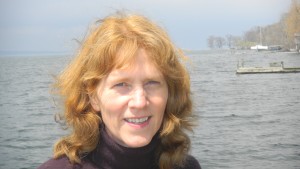
Jennifer A. Glancy is the McDevitt Core Professor and Professor of Religious Studies at Le Moyne College in Syracuse, New York.
I applied to the institute in order to work on teaching projects, and that’s what I’ve done.
I have received an internal grant from Le Moyne College to develop a First Year Seminar on Mortality and Immortality. I’m eager to be part of ongoing conversations with institute participants and others who have integrated mortality into their curricula.
At the institute, I presented on another course in development, “The Future of Being Human,” which will be offered for five successive semesters, beginning in Spring 2015. Mortality will be one thread in the story that course teaches. I anticipate that “The Future of Being Human” will have a significant impact, enrolling 100 students a semester (large by Le Moyne students), featuring both large lecture sessions and more intimate seminar sessions. I’m not sure whether that material can be digested in a form for the website, but I did want to let you know that the institute will inform my teaching in that context as well–the syllabus approved for the spring includes some readings we did as well as readings suggested by other participants when I presented. With the somewhat improbable title of “McDevitt Core Professor” (I’m not much for titles, but there it is), I have some resources for the course; at some point may be able to invite one or two institute participants to join us for a night or two–I’ll keep you posted if that works out.
Right now teaching is at the heart of my professional agenda. I’m keeping up a steady stream of articles, but largely in response to specific invitations. I have resisted some (tempting) offers from presses to work on larger projects–I don’t want to begin my next book until I’m passionate about what I’m working on. At this point I anticipate that mortality (and related questions of what it means to be human) will be central to that project, but I’m taking my time to think it through…
I want you to know that the institute made a significant impact.
